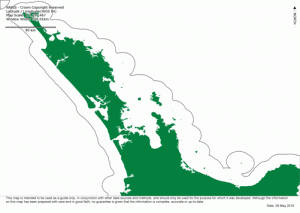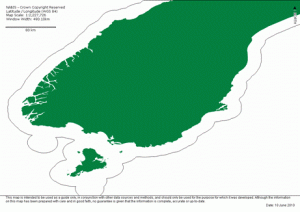Whatever the outcome of coastal iwi quests for customary title to the foreshore and seabed, under Mark2 of the foreshore and seabed agreement, two lessons stand out. Firstly the National Party is only too happy for power and political expediency, to racially privatise public property such as the foreshore and seabed to iwi.
Secondly iwi and the race-based Maori Party are always looking for opportunities to use their status as “indigenous” people to claim tribal ownership of important community resources, such as the foreshore and seabed.
The foreshore and seabed is very important to all New Zealanders for many reasons. Firstly, as a major trading country, it is for our ports and their major shipping trade with the outside world.
Secondly, and most importantly for most of us, our beaches and coasts are the primary places for recreation in New Zealand. Think beaches, sunbathing, swimming, recreational fishing, food-gathering, yachting, boating, seaside baches and mansions, underwater diving and just walking come to mind.
Thirdly, commercial fishing, aquaculture, coastal tourism, marinas, wharves, oil, gas and minerals production, etc providing jobs and industry. Then there is the potential of the coastal sea and the 200 nautical mile Exclusive Economic Zone (EEZ) and continental shelf to provide additional community and national wealth in future.
Extent of the foreshore and seabed (territorial and inland sea) in the Upper North Island
Fourth, they are areas of high biodiversity, rich in many different species. The shallow interfaces between land and sea on the foreshore and seabed are important areas where land-based, freshwater and sea life intermingle, and where many marine species breed. They are where we encounter and interact with more diverse species than anywhere else.
This makes the coasts dear to our hearts in many ways. Many billions of dollars are already invested, and there is the potential to productively invest many billions more. New Zealand’s EEZ beyond the foreshore and seabed, is the fourth largest in the world. However all this seems lost on the National Party, who have lost the plot for perceived short-term politics.
It is also why iwi privatisation is so attractive to Maori. Under Chris Finlayson’s Bill they will gain control of any areas declared to be “customary title”. This is because National proposes very strong private property rights, including exclusive mining, aquaculture and development rights for ‘customary title’. This will give iwi income from present investments as leases expire and also control of all future investments.
Did iwi ownership of the foreshore and seabed ever exist?. Traditional Maori ownership was indicated by ahi ka, fires of occupation. This clearly does not apply to the foreshore and seabed, so it is significantly different from dry land.
The territorial and inland sea, as the foreshore and seabed is normally called, is governed by international Law of the Sea treaties. In and before 1840 the territorial sea stretched only 3 nautical miles (5.5 km) from shore. This was the assessed limit of coastal cannon able to defend it. It was only in 1977 that New Zealand’s outer limit was increased to 12 nautical miles (22.1 km), for sovereign ownership and management reasons.
Extent of the foreshore and seabed (territorial sea) in central New Zealand
The three maps attached show the vast extent of the foreshore and seabed, and how it includes all harbours, estuaries and inlets, including the Marlborough Sounds, the Hauraki Gulf and the Firth of Thames, the Fiords, Golden Bay, Foveaux Strait and Patterson Inlet. These are the areas most suited to aquaculture and recreation.
The Court of Appeal, in its 2003 decision, questioned the Crown’s ownership since 1840. But the Court did not say customary title existed, only that it may exist, and that this would probably be hard to prove. Hence the stacked 2009 Maori Review Panel’s preference for the Crown awarding customary title to all coastal iwi, over the whole territorial sea.
The Court of Appeal’s 2003 decision opened a Pandora’s box, where previously Crown ownership had existed largely unchallenged. It led quickly to coastal iwi targeting iwi customary ownership of all of the more than ten million hectares of our territorial sea (the foreshore and seabed), which covers the equivalent of more than 35% of our total land area.
Labour’s 2004 Act was aimed at re-asserting Crown ownership by Parliament, the highest court in the land. It still provided for iwi recognition, though not customary title. Retaining this Act, rather than repealing it as National and the Maori Party intend, appears very appropriate to many citizens. The Maori Party represents only a small percentage of those with Maori ancestry. Indeed many with Maori lineage regard the claims process as divisive.
A major issue with National’s agreement with the Maori Party is that it evades proving the existence of iwi customary title, by instead defining it. So therefore it will exist, if an iwi meets specified conditions, primarily continuous exclusive occupation.
National is also adopting the present 12 nautical mile definition of the territorial sea, not the three nautical miles that existed from 1840 to 1977. This is highly questionable.
Iwi may get their day in Court. But the rest of us won’t. Judging by its badly flawed and very brief (20 working days) consultation with the public, National doesn’t consider the rest of us worthy of consideration. It immediately refused strong requests by the Coastal Coalition for an extension, in spite of allowing an eighteen working day extension for
mining-in-national-parks submissions.
A new proposal for so-called “universal recognition” is presumably accepted by National as a sop to the Maori Party. It is another race-based privilege that is not justified. “Universal recognition” is a grandiose name for all coastal iwi being given interference rights over others for the territorial sea adjacent to their tribal areas. These are race-based property rights that non-Maori citizens or groups cannot be awarded. There is no justification for awarding them to iwi. They are another major step by National toward Maori separatism.
The Maori Party’s Mark2 agreement with National, though it may not yield control of all the foreshore and seabed to iwi, is still a huge step towards iwi exploitation ambitions. A new class of race-based territorial sea property owners, iwi and hapu, will be created, with exclusive property rights to develop and control their areas, including for currently established activities.
As well, it will create unlimited opportunities for the Courts to create precedent exclusive to one ethnicity, Maori descendants. National’s “solution” to ownership of the foreshore and seabed is an ill-thought-out unacceptable race-based shambles. It ignores the interests of the rest of the community. It must be turned down by the rest of us in favour of Crown ownership on behalf of us all, as at present.
Extent of the foreshore and seabed (territorial sea) in southern New Zealand



